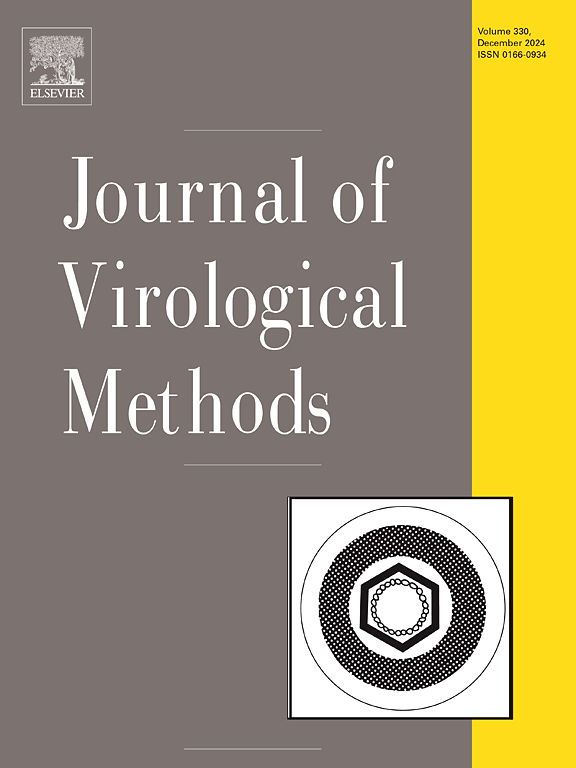Accurate vector copy number determination in gammaretroviral vector producer cell clones using triplex digital droplet PCR
IF 1.6
4区 医学
Q3 BIOCHEMICAL RESEARCH METHODS
引用次数: 0
Abstract
Gammaretroviral vectors are widely used in cellular and gene therapy products because of the availability of stable vector producer cells. Accurately assessing vector copy number (VCN) is critical for selecting appropriate clones to avoid the risks of homologous recombination and complications in mutation detection. Traditional methods such as quantitative polymerase chain reaction (PCR) and Southern blotting have limitations in accuracy and throughput. This study presents a triplex droplet digital PCR (ddPCR) method for analyzing the VCN in gammaretroviral vector producer cells. We designed a universal primer– probe set targeting the packaging signal sequence common to murine leukemia virus– and murine stem cell virus– based gammaretroviral vectors. Two reference genes were selected after karyotyping the PG13 gammaretroviral vector packaging cell line to identify stable chromosomes. The triplex ddPCR assay was optimized and verified using PG13 cells transduced with constructs of different transgene and vector backbones. The assay showed high concordance with Southern blot. Using multiple reference genes ensures accurate and robust VCN assessment, especially in cell lines with chromosomal instability. This method improves the clone selection process for gammaretroviral vector producer cells, accelerates the development of novel cellular and gene therapy products, and ensures their rapid delivery to patients.
利用三重数字液滴聚合酶链式反应准确测定伽马逆转录病毒载体生产细胞克隆中的载体拷贝数。
由于可以获得稳定的载体生产细胞,伽马逆转录病毒载体被广泛应用于细胞和基因治疗产品中。准确评估载体拷贝数(VCN)对于选择合适的克隆以避免同源重组风险和突变检测的复杂性至关重要。定量聚合酶链反应(PCR)和 Southern 印迹等传统方法在准确性和通量方面存在局限性。本研究提出了一种三重液滴数字 PCR(ddPCR)方法,用于分析伽马逆转录病毒载体生产细胞中的 VCN。我们设计了一套通用引物-探针,以鼠白血病病毒和鼠干细胞病毒为基础的伽马逆转录病毒载体所共有的包装信号序列为目标。在对 PG13 伽玛逆转录病毒载体包装细胞系进行核型鉴定以确定稳定的染色体后,我们选择了两个参考基因。使用不同转基因和载体骨架构建体转导的 PG13 细胞对三重 ddPCR 检测进行了优化和验证。该检测方法与 Southern 印迹的一致性很高。使用多个参考基因可确保准确、稳健地评估 VCN,尤其是在染色体不稳定的细胞系中。这种方法改进了伽马逆转录病毒载体生产细胞的克隆选择过程,加快了新型细胞和基因治疗产品的开发,并确保它们能迅速送达患者手中。
本文章由计算机程序翻译,如有差异,请以英文原文为准。
求助全文
约1分钟内获得全文
求助全文
来源期刊
CiteScore
5.80
自引率
0.00%
发文量
209
审稿时长
41 days
期刊介绍:
The Journal of Virological Methods focuses on original, high quality research papers that describe novel and comprehensively tested methods which enhance human, animal, plant, bacterial or environmental virology and prions research and discovery.
The methods may include, but not limited to, the study of:
Viral components and morphology-
Virus isolation, propagation and development of viral vectors-
Viral pathogenesis, oncogenesis, vaccines and antivirals-
Virus replication, host-pathogen interactions and responses-
Virus transmission, prevention, control and treatment-
Viral metagenomics and virome-
Virus ecology, adaption and evolution-
Applied virology such as nanotechnology-
Viral diagnosis with novelty and comprehensive evaluation.
We seek articles, systematic reviews, meta-analyses and laboratory protocols that include comprehensive technical details with statistical confirmations that provide validations against current best practice, international standards or quality assurance programs and which advance knowledge in virology leading to improved medical, veterinary or agricultural practices and management.

 求助内容:
求助内容: 应助结果提醒方式:
应助结果提醒方式:


